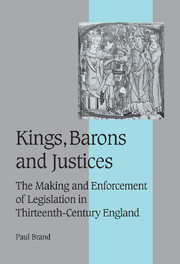Book contents
- Frontmatter
- Contents
- List of tables
- Preface
- List of abbreviations
- INTRODUCTION
- Part I Politics and the legislative reform of the common law: from the Provisions of Westminster of 1259 to the Statute of Marlborough of 1267
- Part II Beyond politics: the enforcement and interpretation of the Statute of Marlborough in the courts, 1267–1307
- Chapter 16 CONCLUSIONS
- Appendix I TEXT AND TRANSLATION OF THE PROVISIONS OF WESTMINSTER OF 1259
- Appendix II TEXT AND TRANSLATION OF THE PROVISIONS OF WESTMINSTER AS REISSUED IN 1263 AND 1264
- Appendix III TEXT AND TRANSLATION OF THE STATUTE OF MARLBOROUGH OF 1267
- Bibliography
- Index
- Cambridge Studies in Medieval Life and Thought Fourth series
Chapter 16 - CONCLUSIONS
Published online by Cambridge University Press: 16 June 2009
- Frontmatter
- Contents
- List of tables
- Preface
- List of abbreviations
- INTRODUCTION
- Part I Politics and the legislative reform of the common law: from the Provisions of Westminster of 1259 to the Statute of Marlborough of 1267
- Part II Beyond politics: the enforcement and interpretation of the Statute of Marlborough in the courts, 1267–1307
- Chapter 16 CONCLUSIONS
- Appendix I TEXT AND TRANSLATION OF THE PROVISIONS OF WESTMINSTER OF 1259
- Appendix II TEXT AND TRANSLATION OF THE PROVISIONS OF WESTMINSTER AS REISSUED IN 1263 AND 1264
- Appendix III TEXT AND TRANSLATION OF THE STATUTE OF MARLBOROUGH OF 1267
- Bibliography
- Index
- Cambridge Studies in Medieval Life and Thought Fourth series
Summary
THE LEGAL AND SOCIAL CONTEXT OF THE LEGISLATION
One of the main purposes of this study has been to place the legislation of 1259–67 in its proper contemporary context. That has meant looking at the individual clauses within the broader context of the development of the English common law and the English legal system during the period prior to its enactment. It has also meant placing the legislation within its more specific context, that of the political events and developments of the years between 1258 and 1267.
The pioneering work of T.F.T. Plucknett on the legal and social context of the legislation of Edward I (which, for his purposes, was taken to include the Statute of Marlborough) was hampered by his exclusive reliance on the sources in print at the time he was writing Legislation of Edward I. This meant that he knew nothing of what was on the plea rolls of the king's courts after 1222 other than the cases copied into Bracton's Note Book. His acquaintance with the manuscript material for the reign of Edward I was limited to the selected King's Bench cases printed by Sayles and the reported cases printed in the Rolls Series Year Books edited by Horwood. This study has attempted to show what can be done by using a much wider range of unprinted as well as printed sources.
- Type
- Chapter
- Information
- Kings, Barons and JusticesThe Making and Enforcement of Legislation in Thirteenth-Century England, pp. 388 - 410Publisher: Cambridge University PressPrint publication year: 2003



